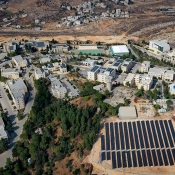International cooperation on water management and gender research launched at Birzeit University
Within the framework of the Palestinian-Dutch Academic Cooperation Program on Water (PADUCO), Palestinian and International researchers organized a Joint Inception Workshop on the 3rdof April, 2018, at Birzeit University (BZU).
The Institute of Environmental and Water Studies together with Al-Quds University, Islamic University of Gaza, and University of Twente, and GVC (Civil Volunteer Group, Italy) organized the workshop.
Rashed Al-Sa’ed, Director of the Institute of Environmental and Water Studies, opened the workshop and underlined the leadership of Birzeit University, together with its partners, in community outreach and services provisions through its institutes and centers. “We’re always looking for new, sustainable partnerships with local and international institutions and organizations that achieve development goals and facilitate knowledge transfer between our students and faculty members and their international counterparts.”
PADUCO Palestine Coordinator Maher Abu Madi (BZU) gave a brief overview of PADUCO and outlined envisaged plans and aims. The project, he said, started in 2012 with sporadic partnerships between Palestinian and international universities, but not between Palestinian universities themselves. He noted that PADUCO’s having at least two Palestinian universities cooperate on a given research project was a main pre-requisite for submitting joint proposals.
During this inception workshop, two joint research projects were introduced. The first, “Multi-Level Contextual Factors of Local Water Management in the West Bank and the Gaza Strip, (CONAWAT)”, is a joint project between Al-Quds University, the Islamic University of Gaza, University of Twente, and GVC- a non-governmental international development organization based in Bologna, Italy.
Jawad Hassan, CONAWAT project leader, said that the project’s main objectives are encouraging research and studies on water management in the West Bank and Gaza, developing guidelines to improve the effectiveness of local water management, and contextualizing the impacts of political factors on water management in the occupied Palestinian territories.
The project, Hassan added, is also looking into forming partnerships with civil society organizations to achieve better water management. “The civil society, with its somewhat decentralized organizations, has the potential and capacity to facilitate this project and provide us with proper feedback and suggestions.”
The second project, “Improving Gender Mainstreaming in PADUCO through Applying the Gender and WASH Toolkit for Palestine, (GEM-PADUCO)”, is the culmination of the joint efforts of Marwan Ghanem, associate professor of hydrogeology at BZU; Giovanni Liu, GVC representative; and Gül Özerol, PADUCO Netherlands coordinator.
Ghanem, the GEM-PADUCO leader, said that the project entails five case studies from the West Bank and Gaza Strip. The case studies aim at the promotion of applied integrated practices and technologies pertinent to sustainable water management and the development of a decision support system for an optimal water management.
“The project aims to identify and implement concrete measures to incorporate the needs and priorities of women, men, girls, and boys within the context of environmental and development interventions.”
In addition to a diversity pool of participants, main stakeholders such as the Palestinian Water Authority, the Environment Quality Authority, and the Ministry of Agriculture also attended the workshop and provided feedback on PADUCO’s integrated projects and suggestions on its workplan.







